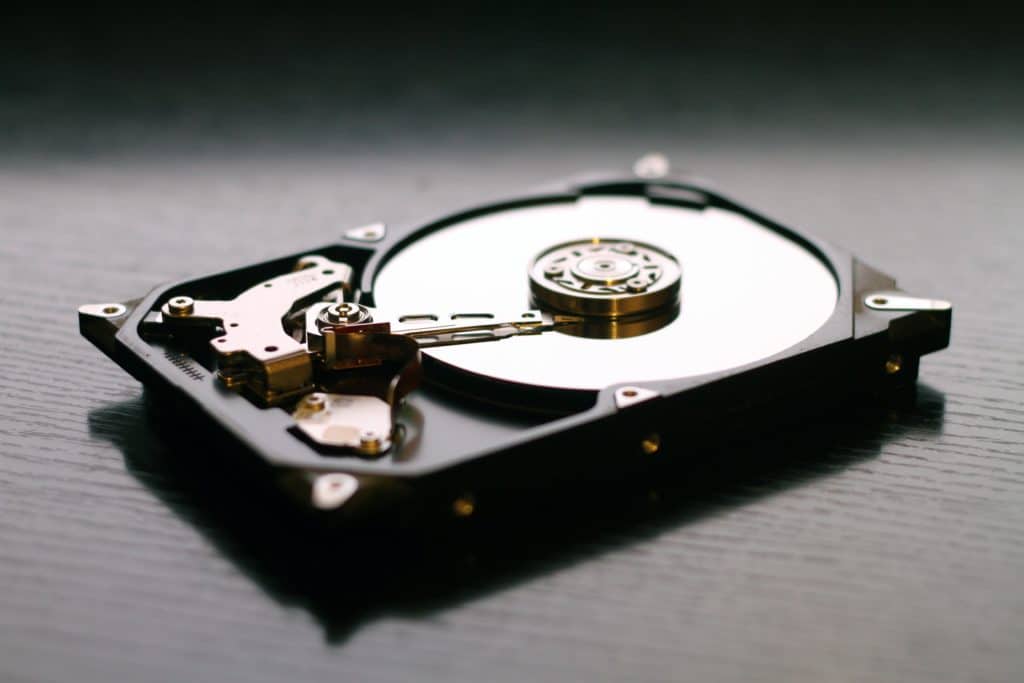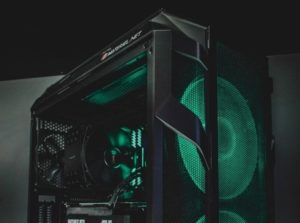What are the differences between the two techniques? Are there any similarities? Which is the right technology for you? Questions upon questions that we want to get to the bottom of here. First, let's take a closer look at the two systems and we'll present you with all the facts you need to know. We hope you enjoy reading the article!
What is HDD technology?
HDD (Hard Disk Drive, also called hard drive) has existed for over 50 years. The technology has already proven itself many times over. With the HDD, the data is written onto a rotating disc (the so-called “platter”) and then retrieved from this rotating disc. To do this, the plates are scanned by a write and/or read head located at the end of the actuator arm. The time spent by the hardware to do this is called “latency”. It is amazing that the components are getting smaller and more compact, while the storage capacity is constantly increasing.
A particular advantage here is that you get a lot for your money (expressed in storage space/money). Another advantage of this technology is that the maximum amount of storage space that can be installed per hard drive is currently much higher than with the SSD. However, despite all the advantages, we also have to tell you about the disadvantages of this technology, because of course there are also disadvantages. One of the disadvantages is that the HDD's data still has to be retrieved mechanically. This takes significantly more time than electronically processing the same data on an SSD.
The HDD mechanism is also much more susceptible to rough, careless handling or treatment. If you fall off your (external) hard drive or laptop Desk, this is usually accompanied by a defect in the hard disk and the stored data is usually over. Another minus point on the part of the HDD is that they are relatively heavy compared to an SSD.
What is the SSD technology?
In contrast to the HDD, the SSD technology is relatively new. The special features here are the moving parts - they don't exist with the SSD. This gives the SSD a special robustness and error resistance. Put simply, the SSD is a large USB stick. The data processing takes place here on the non-volatile memory.
This means that your data is not lost after shutting down and switching off the computer, it remains saved. Since no actuator arm has to be moved over the rotating plates to scan (as with HDD technology), you can read and write your data faster. This drastically reduces the previously mentioned latency and is particularly recommended for gaming.
The SSD is also significantly less sensitive to falls and bumps. If an SSD falls off your desk, this will probably not have any major consequences (exceptions prove the rule here). But not only here does the SSD have clear advantages over the HDD. So the SSD are real power-saving miracles, which is also noticeable when the computer heats up less.
The only disadvantages that we could now find in the SSD are the (still) high purchase price of this, the "small" storage capacity and the high susceptibility to failure or the imminent total loss of data, for example in the event of a power failure.
what is better now HDD or SSD?
Basically, no blanket judgment can be made as to whether an HDD or an SSD is better. The SSD enables much faster access to your data. However, the SSD are also considerably more expensive than the HDD. You also have to accept a significant loss in storage capacity with the SSD, because they are only available in sizes of 128 or 256GB. HDDs offer a multiple of this capacity.
But if you are primarily concerned with speed, then the SSD is clearly ahead, because it is usually four to five times faster than the HDD. Another argument in favor of the SSD is that it has low power consumption, does not cause a lot of intrinsic noise and does not require any special cooling.
However, the SSD also has its weak points: in the event of a fault or a power failure, it can happen that the SSD not only loses individual files, but it can also mean the total loss of all data. On the other hand, the HDDs are (still) cheaper to get than the SSD and they offer you much more storage space (up to eight terabytes compared to a maximum of two terabytes with the SSD).
HDD or SSD? Our conclusion
Basically, you have to think about what your focus is on. Are you all about speed? Or do you need maximum storage capacity? You should also know your budget beforehand, because the SSD will have a much higher purchase price.
In principle, both techniques can be recommended, depending on where the requirements lie. However, no general recommendation can be made, since each user has individual requirements for a storage medium.








